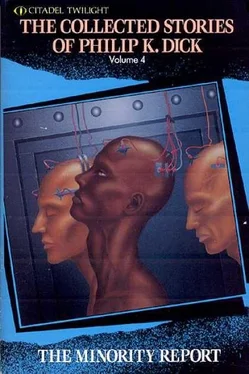On the platform, seated at the table with the four governing building trustees, chairman Donald Klugman felt sick at his stomach. A peaceful man, he shrank from these violent squabbles. Even seated in the audience he found it too much for him, and here tonight he would have to take active part; time and tide had rotated the chair around to him, as it did to each resident in turn, and of course it would be the night the school issue reached its climax.
The room had almost filled and now Patrick Doyle, the current building sky pilot, looking none too happy in his long white robe, raised his hands for silence. "The opening prayer," he called huskily, cleared his throat and brought forth a small card. "Everyone please shut their eyes and bow their heads." He glanced at Klugman and the trustees, and Klugman nodded for him to continue. "Heavenly Father," Doyle said, "we the residents of the communal apartment building Abraham Lincoln beseech You to bless our assembly tonight. Um, we ask that in Your mercy You enable us to raise the funds for the roof repairs which seem imperative. We ask that our sick be healed and our unemployed find jobs and that in processing applicants wishing to live amongst us we show wisdom in whom we admit and whom we turn away. We further ask that no outsiders get in and disrupt our law-abiding, orderly lives and we ask in particularly that lastly, if it be Thy will, that Nicole Thibodeaux be free of her sinus headaches which have caused her not to appear before us on TV lately, and that those headaches not have anything to do with that time two years ago, which we all recall, when that stagehand allowed that weight to fall and strike her on the head, sending her to the hospital for several days. Anyhow, amen."
The audience agreed, "Amen."
Rising from his chair, Klugman said, "Now, before the business of the meeting, we'll have a few minutes of our own talent displayed for our enjoyment. First, the three Fettersmoller girls from apartment number 205. They will do a soft-shoe dance to the tune of 'I'll Build a Stairway to the Stars.' " He reseated himself, and onto the stage came the three little blonde-haired children, familiar to the audience from many talent shows in the past.
As the Fettersmoller girls in their striped pants and glittery silver jackets shuffled smilingly through their dance, the door to the outside hall opened and a late-comer, Edgar Stone, appeared.
He was late, this evening, because he had been grading test papers of his next-door neighbor, Mr. Ian Duncan, and as he stood in the doorway his mind was still on the test and the poor showing which Duncan – whom he barely knew – had made. It seemed to him that without even having finished the test he could see that Duncan had failed.
On the stage the Fettersmoller girls sang in their scratchy voices, and Stone wondered why he had come. Perhaps for no more reason than to avoid the fine, it being mandatory for the residents to be here, tonight. These amateur talent shows, put on so often, meant nothing to him; he recalled the old days when the TV set had carried entertainment, good shows put on by professionals. Now of course all the professionals who were any good were under contract to the White House, and the TV had become educational, not entertaining. Mr. Stone thought of great old late-late movies with comics such as Jack Lemmon and Shirley MacLaine, and then he looked once more at the Fettersmoller girls and groaned.
Corley, hearing him, glanced at him severely.
At least he had missed the prayer. He presented his identification to Corley's new machine and it allowed him to pass down the aisle toward a vacant seat. Was Nicole watching this, tonight? Was a White House talent scout present somewhere in the audience? He saw no unfamiliar faces. The Fettersmoller girls were wasting their time. Seating himself, he closed his eyes and listened, unable to endure watching. They'll never make it, he thought. They'll have to face it, and so will their ambitious parents; they're untalented, like the rest of us… Abraham Lincoln Apartments has added little to the cultural store of the nation, despite its sweaty, strenuous determination, and you are not going to be able to change that.
The hopelessness of the Fettersmoller girls' position made him remember once more the test papers which Ian Duncan, trembling and waxen-faced, had pressed into his hands early that morning. If Duncan failed he would be even worse-off than the Fettersmoller girls because he would not even be living at Abraham Lincoln; he would drop out of sight – their sight, anyhow – and would revert to a despised and ancient status: he would find himself once more living in a dorm, working on a manual gang as they had all done back in their teens.
Of course he would also be refunded the money which he had paid for his apartment, a large sum which represented the man's sole major investment in life. From one standpoint, Stone envied him. What would I do, he asked himself as he sat eyes closed, if I had my equity back right now, in a lump sum? Perhaps, he thought, I'd emigrate. Buy one of those cheap, illegal jalopies they peddle at those lots which -
Clapping hands roused him. The girls had finished, and he, too, joined in the applause. On the platform, Klugman waved for silence. "Okay, folks, I know you enjoyed that, but there's lots more in store, tonight. And then there's the business part of the meeting; we mustn't forget that." He grinned at them.
Yes, Stone thought. The business. And he felt tense, because he was one of the radicals at Abraham Lincoln who wanted to abolish the building's grammar school and send their children to a public grammar school where they would be exposed to children from other buildings entirely. It was the kind of idea which met much opposition. And yet, in the last weeks, it had gained support. What a broadening experience it would be; their children would discover that people in other apartment buildings were no different from themselves. Barriers between people of all apartments would be torn down and a new understanding would come about.
At least, that was how it struck Stone, but the conservatives did not see it that way. Too soon, they said, for such mixing. There would be outbreaks of fights as the children clashed over which building was superior. In time it would happen… but not now, not so soon.
Risking the severe fine, Ian Duncan missed the assembly and remained in his apartment that evening, studying official Government texts on the religio-political history of the United States – relpol, as they were called. He was weak in this, he knew; he could barely comprehend the economic factors, let alone all the religious and political ideologies that had come and gone during the twentieth century, directly contributing to the present situation. For instance, the rise of the Democratic-Republican Party. Once it had been two parties, engaging in wasteful quarrels, in struggles for power, just the way buildings fought now. The two parties had merged, about 1985. Now there was just the one party, which had ruled a stable and peaceful society, and everyone belonged to it. Everyone paid dues and attended meetings and voted, each four years, for a new President – for the man they thought Nicole would like best.
It was nice to know that they, the people, had the power to decide who would become Nicole's husband, each four years; in a sense it gave to the electorate supreme power, even above Nicole herself. For instance, this last man, Taufic Negal. Relations between him and the First Lady were quite cool, indicating that she did not like this most recent choice very much. But of course being a lady she would never let on.
When did the position of First Lady first begin to assume stature greater than that of President? the relpol text inquired. In other words, when did our society become matriarchal, Ian Duncan said to himself. Around about 1990; I know the answer to that. There were glimmerings before that; the change came gradually. Each year the President became more obscure, the First Lady became better known, more liked, by the public. It was the public which brought it about. Was it a need for mother, wife, mistress, or perhaps all three? Anyhow they got what they wanted; they got Nicole and she is certainly all three and more besides.
Читать дальше










